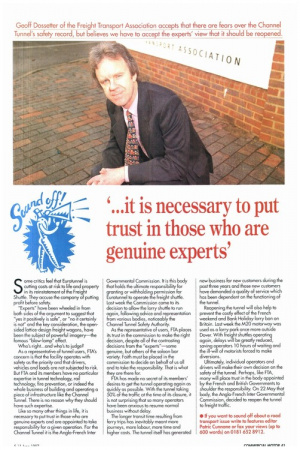'...it is necessary to put trust in those who are genuine experts'
Page 43

If you've noticed an error in this article please click here to report it so we can fix it.
Some critics feel that Eurotunnel is cutting costs at risk to life and property in its reinstatement of the Freight Shuttle. They accuse the company of putting profit before safety.
"Experts" have been wheeled in from both sides of the argument to suggest that "yes it positively is safe" or "no it certainly is not" and the key consideration, the opensided lattice-design freight wagons, have been the subject of powerful imagery—the famous "blow-lamp" effect.
Who's right.. and who's to judge? As a representative of tunnel users, FTA's concern is that the facility operates with safety as the priority and that drivers, vehicles and loads are not subjected to risk. But FTA and its members have no particular expertise in tunnel technology, rail technology, fire prevention, or indeed the whole business of building and operating a piece of infrastructure like the Channel Tunnel. There is no reason why they should have such expertise.
Like so many other things in life, it is necessary to put trust in those who are genuine experts and are appointed to take responsibility For a given operation. For the Channel Tunnel it is the Anglo-French Inter Governmental Commission. It is this body that holds the ultimate responsibility for granting or withholding permission for Eurotunnel to operate the freight shuttle. Last week the Commission came to its decision to allow the lorry shuttle to run again, following advice and representation from various bodies, noticeably the Channel Tunnel Safety Authority. As the representative of users, FTA places its trust in the commission to make the right decision, despite all of the contrasting decisions from the "experts"—some genuine, but others of the saloon bar variety. Faith must be placed in the commission to decide on behalf of us all and to take the responsibility. That is what they are there For. FTA has made no secret of its members' desires to get the tunnel operating again as quickly as possible. With the tunnel taking 50% of the traffic at the time of its closure, it is not surprising that so many operators have been anxious to resume normal business without delay The longer transit time resulting from ferry trips has inevitably meant more journeys, more labour, more time and higher costs. The tunnel itself has generated new business for new customers during the past three years and those new customers have demanded a quality of service which has been dependent on the functioning of the tunnel.
Reopening the tunnel will also help to prevent the costly effect of the French weekend and Bank Holiday lorry ban on Britain. Last week the M20 motorway was used as a lorry park once more outside Dover. With freight shuttles operating again, delays will be greatly reduced, saving operators 10 hours of waiting and the of motorists forced to make diversions.
Ultimately, individual operators and drivers will make their own decision on the safety of the tunnel. Perhaps, like FTA, many will place trust in the body appointed by the French and British Governments to shoulder the responsibility. On 22 May that body, the Anglo-French Inter Governmental Commission, decided to reopen the tunnel to freight traffic.




































































































